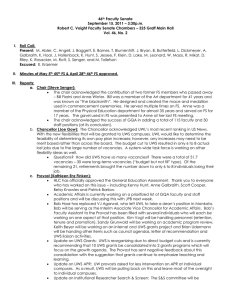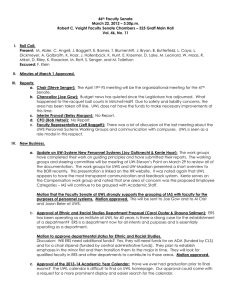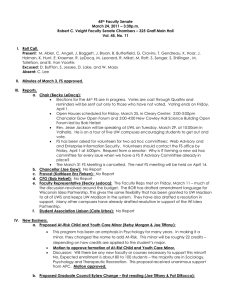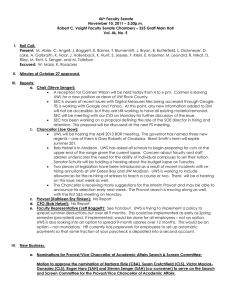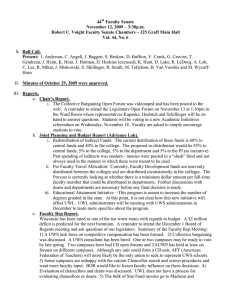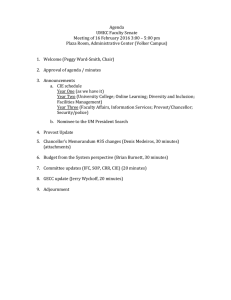46 Faculty Senate February 16, 2012 – 3:30p.m.
advertisement
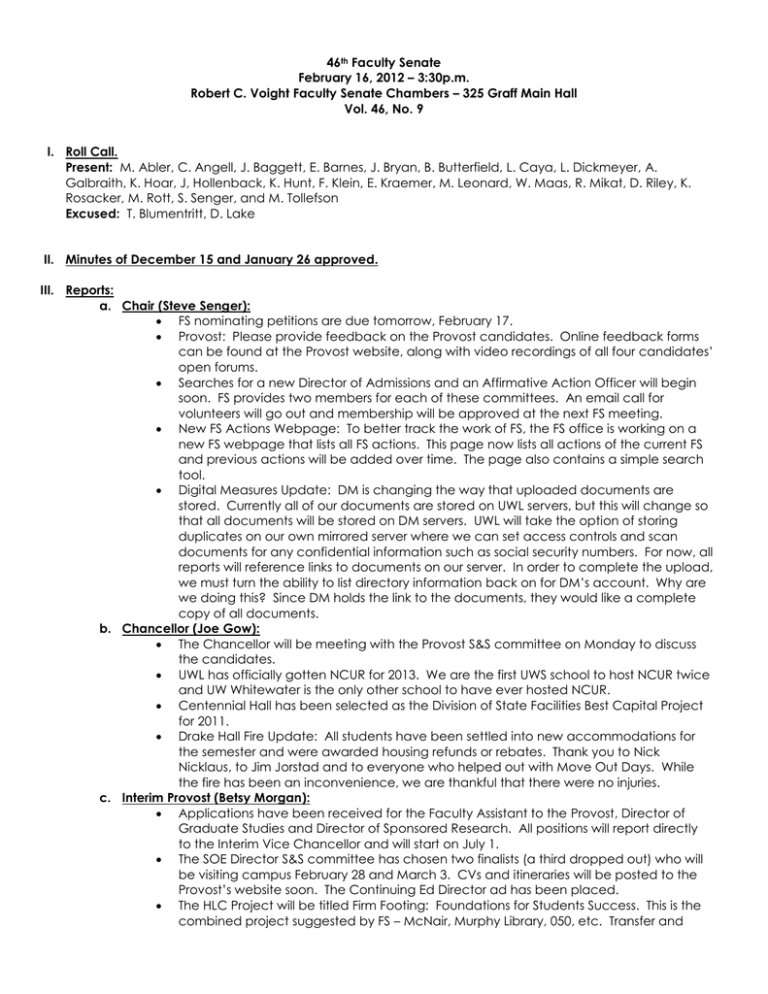
46th Faculty Senate February 16, 2012 – 3:30p.m. Robert C. Voight Faculty Senate Chambers – 325 Graff Main Hall Vol. 46, No. 9 I. Roll Call. Present: M. Abler, C. Angell, J. Baggett, E. Barnes, J. Bryan, B. Butterfield, L. Caya, L. Dickmeyer, A. Galbraith, K. Hoar, J, Hollenback, K. Hunt, F. Klein, E. Kraemer, M. Leonard, W. Maas, R. Mikat, D. Riley, K. Rosacker, M. Rott, S. Senger, and M. Tollefson Excused: T. Blumentritt, D. Lake II. Minutes of December 15 and January 26 approved. III. Reports: a. Chair (Steve Senger): FS nominating petitions are due tomorrow, February 17. Provost: Please provide feedback on the Provost candidates. Online feedback forms can be found at the Provost website, along with video recordings of all four candidates’ open forums. Searches for a new Director of Admissions and an Affirmative Action Officer will begin soon. FS provides two members for each of these committees. An email call for volunteers will go out and membership will be approved at the next FS meeting. New FS Actions Webpage: To better track the work of FS, the FS office is working on a new FS webpage that lists all FS actions. This page now lists all actions of the current FS and previous actions will be added over time. The page also contains a simple search tool. Digital Measures Update: DM is changing the way that uploaded documents are stored. Currently all of our documents are stored on UWL servers, but this will change so that all documents will be stored on DM servers. UWL will take the option of storing duplicates on our own mirrored server where we can set access controls and scan documents for any confidential information such as social security numbers. For now, all reports will reference links to documents on our server. In order to complete the upload, we must turn the ability to list directory information back on for DM’s account. Why are we doing this? Since DM holds the link to the documents, they would like a complete copy of all documents. b. Chancellor (Joe Gow): The Chancellor will be meeting with the Provost S&S committee on Monday to discuss the candidates. UWL has officially gotten NCUR for 2013. We are the first UWS school to host NCUR twice and UW Whitewater is the only other school to have ever hosted NCUR. Centennial Hall has been selected as the Division of State Facilities Best Capital Project for 2011. Drake Hall Fire Update: All students have been settled into new accommodations for the semester and were awarded housing refunds or rebates. Thank you to Nick Nicklaus, to Jim Jorstad and to everyone who helped out with Move Out Days. While the fire has been an inconvenience, we are thankful that there were no injuries. c. Interim Provost (Betsy Morgan): Applications have been received for the Faculty Assistant to the Provost, Director of Graduate Studies and Director of Sponsored Research. All positions will report directly to the Interim Vice Chancellor and will start on July 1. The SOE Director S&S committee has chosen two finalists (a third dropped out) who will be visiting campus February 28 and March 3. CVs and itineraries will be posted to the Provost’s website soon. The Continuing Ed Director ad has been placed. The HLC Project will be titled Firm Footing: Foundations for Students Success. This is the combined project suggested by FS – McNair, Murphy Library, 050, etc. Transfer and International students will be added as areas that still need to be addressed. Sandy Grunwald will be the HLC liaison for the project and the following individuals will be attending the HLC conference in March: Natalie Solverson, Patrick Barlow, Jennifer Kosiak, Maggie McHugh and Virginia Crank. The recently approved summer pay plan will be implemented for Summer 2012. What about J Term? Unlike summer, we get no extra funding for J Term. We will probably wait until summer session is over and see how the system worked. The stipend will most likely be a set stipend (regardless of rank) and will be modeled on the $80/credit system – although it has not been determined yet if there is enough funding for this. d. CFO (Bob Hetzel): Parking Ramp: We have received approval from UWS and the BOR for the parking ramp project. This project will lay the foundation for two other UWL building projects – Cowley and a new student union. The ramp will be built on the gravel lots just west of Cleary Center and will house a new police station and 600 stalls. This frees up the Cowley lot for the new science building and the Wimberly lot for a new student union. Cowley Hall: The UWS Capital Planning Committee is encouraging UWL to request phase 1 and phase 2 of the new science building at the same time. This would be a $136 million project that would begin in the 13-15 biennium and take 6 years to design and complete. This is a significant project, as no other capital planning project has exceeded $40 million. The Process: UWL will ask for enumeration from the State Building Commission in the middle of 2013. The BOR will recommend enumeration of phase 1 and advanced enumeration of phase 2. This is a critical step for the project. Phase 1 is an $80 million building that will be about the size of Centennial Hall and phase 2 would be a $55 million building, just a little smaller than Centennial Hall. Phase 2 requires the demolition of Cowley Hall. If students vote for a new SU, then we would repurpose Cartwright Center for temporary Cowley faculty offices. The Chancellor and FS thanked Bob Hetzel and Matt Lewis for their hard work on this project. New Student Union: This is a student driven project and there are a large number of students on the planning committee. Ideas for the new student union can be viewed in the glass case next to the Chancellor’s office. What would happen to Cartwright Center? It would be turned into green space. Original plans had it become parking space; however, the new parking ramp has space for adding up to 400 more spaces if needed in the future. The students will vote on a referendum in April whether to build a new student union (which would add $300 to the current $1000/year SAG fees) or to repair and update Cartwright Center (which would add $200 to $240 to SAG fees). Classroom/Lab Renovation Proposals: Four projects will be submitted to UWS for funding consideration for the 11-13 biennium: 1) $1.3 million renovation of Graff Main Hall auditorium, 2) $960,000 renovation of the Human Performance Lab in Mitchell Hall, 3) $840,000 renovation of the Athletic Training facility in Mitchell Hall and 4) $800,000 renovation of the Strength and Conditioning Lab in Mitchell Hall. We will not get funding for all 4 projects, but are hoping to fund two of them. We are competing against all of the comprehensives for funding and will find out if we get funding at the April BOR meeting. Centennial Hall Updates: There have been concerns made about screens overlapping whiteboards so that both cannot be used at the same time and about the lack of Smart boards in the building. We will be collecting feedback about any other issues in the building and would like to address these during summer 2013. GQA Faculty Office Space: There are currently projects planned for adding office space in Cowley, Wimberly and Morris Halls for new faculty. e. Faculty Representative (Jeff Baggett): A report on the February 3 Faculty Reps meeting included: University Personnel System Working Groups – Many (most?) campuses complained that there was little or no faculty/staff input into formation of the working groups. Al Crist (UWS HR Director) explained that UPS is on a very fast time line driven by the legislature. Payroll deductions and 12 month pay: We are on track to have this year’s multiple May deductions spread out over 2 or 3 months. The option of 12 paychecks for 9-month employees has been put on hold until the current HR system is stable. There are general concerns on some campuses about administrative response to budget problems – from limiting release time to forced curricular decisions by trimming AS and pressures to remove classes from Gen Ed. There are currently bills in the legislature the at would give all campuses the ability to add differential tuition, extend the deadline to withdraw from Wiscnet by one year and give new employees the option of opting out of WRS. A committee is being formed to review UWS Grants that will include faculty/staff from campuses. The committee will make recommendations to Mark Nook, VP Academic Affairs. (Bob Hoar helped design the application and review process.) National Council on Teacher Quality (NCTQ) is suing the BOR for access to syllabi in Teacher Education programs. Who owns syllabi? Since 1980, the total 102 funding per student in UWS (including state and tuition contributions) tracks inflation as measured by the Consumer Price Index, but it is behind the Higher Education Price Index. IV. New Business. a. Proposed By-laws for Academic Technology Committee (First Reading): The ATC has been an ad hoc committee and the adoption of their bylaws (which have been approved by A&B) would make this a standing FS committee. Adoption of the bylaws requires a first and second reading. Motion to adopt the bylaws. A second reading will take place at the March 1 FS meeting. b. Discussion of Digital Measures: SEC sent out a survey to faculty last fall following the DM security issues. There was strong support (2/3 of responders) for an alternative to DM. SEC is discussing how to proceed and is bringing the issue to FS for further discussion. DM is currently used for annual, promotion and retention reports and produces a CV-like report and links to other pertinent items, such as a promotion narrative. Reports are generated by individuals and forwarded to chairs and supervisors and finally on to deans and committees in pdf format. It is clear that an electronic process needs to be maintained, but is DM the best tool for our purposes? The survey that SEC is asking for feedback on includes four options: Option 1 would have no database and individuals would be free to develop portfolios and appendices. Option 2 would again have no database, but reports would follow a template. Option 3 would be a more coarse-grained database tool – for example, individuals would input full citations into a single field versus the very detailed and numerous fields used in DM. Option 4 would be DM. Discussion: Once annual activity reports are forwarded to chairs/deans, what are they used for? They are generally under-used, but are often the only way to see what is happening across campus or within units. The reports could be an information gathering system to make decisions and write reports or even to create awareness of activities. Why does the new survey lack any mention of security and confidentiality? The last survey was specifically about this issue, so SEC has a clear idea of what the faculty want done about this issue. We now need to gather feedback on other aspects of the system. DM is used intensely by CBA for accreditation reports, annual college and alumni reports and assessment study. A database is a crucial part of program review. External reviewers ask for data for writing their reports. Individuals access the database for various reports (promotion, merit, etc.) We can change DM to be more coarse grained if that is what faculty want. I would prefer to work with DM to make the system what we want it to be rather than walk away from it. Just because the tool is fine grained doesn’t mean that everyone need to use every part of it. The work of inputting the data falls on the individual and if it is not putting out a useful product, then it is not working. Queries and report types are limited and are a nightmare to generate. If we had in in-house database, we could design it to meet our purposes better. We are asking DM to do things that it was not intended to do. It was not intended to produce promotion reports, it was designed for eportfolios. We have modified it to do these things, but it is not meant for this. Do we need a database? Yes. Is DM the best option? I don’t know, I have never been given an option. Would option 3 work for administrative needs? It would be much faster and easier for individuals. Should Option 1 be pulled from the survey if it is not a viable alternative? If left in, the survey would then include a full spectrum of choices. DM has a huge learning curve. It produces ugly reports and we spend a lot of time trying to fix them. A suggestion to make the wording of Option 3 more clear by clarifying that “by hand” means through Word, etc. DM was developed for the purpose it is used for. DM has always known exactly what UWL is using it for. Betsy spent 3 year working on getting the interface to work for our purposes and is concerned about the implications of the survey. What happens to the information that has already been uploaded to DM? CBA was using Sedona prior to DM. There was no way to transfer data directly – everything moved into service and had to be moved to correct fields by hand. Transition to any option would be problematic. Option 3 does not indicate who would develop the database and how. The DM committee was made up of members from across campus and, given the needs of the campus at the time, DM was the product that best suited those needs. I would really like to see us work with Cari Mathwig and DM to make DM what we want it to be. Please remember that the whole idea of DM was to make it possible for faculty to only have to enter information once. Betsy worked with every department on campus to design DM to work for everyone’s needs. Option 3 would not be as easy as the survey makes it sound. There are only two products – DM and Sedona. DM is the only one that allows customers to make their own data fields and to add attachments to reports. Sedona will not allow us to add fields and has only added the attachment feature in the last year. DM is used by 2000 colleges in 25 countries. We should think about the magnitude of a change. It does not reduce faculty work. If I keep all of my data in a Word document, then I have to cut and paste everything into DM. All of my information is in DM. Now that it is uploaded and I know how to work the database, I do not want to learn a new system and re-load all of my data. This survey will not choose the system. Once we know what the faculty prefer, the next step would be to identify an alternative system and study the costs and benefits, etc. Would this be an appropriate time and way to ask faculty about features that they would like to see changed in DM. Would it be helpful to have an open-ended item for a person to elaborate? Yes, this was planned. Is it possible to modify DM to solve the problems that faculty have with it? We don’t know. We need to know where we are on the spectrum of desires of faculty. We could add a free response area for “What are the things in DM that you would most want to change if we were to keep DM?” The main thing keeping me from applying for promotion is that I don’t want to have to go back and add all of my previous information. For promotion, it is only necessary to upload information back to previous promotion, 6 semesters for teaching and a CV for the rest. It would be helpful to give more information about what the alternatives to DM are (in option 3). For example, Sedona would not be a viable alternative for the Arts since it will not allow for added fields for narratives, but instead makes bulleted lists. I would move to add an open-ended question about what would you like to change if we choose to keep DM. There is still an issue of security. Any alternative database would have to meet our security needs. The survey should include a comment that we are aware of security concerns and that any alternative would need to address those concerns. c. Discussion of Recent Technology Issues: SEC has been contacted about IT issues and would like to give FS an opportunity to voice any concerns. SEC will meet with IT and report back to FS. I am concerned about veiled threats about losing internet access and not getting replacement equipment because the deans don’t have an inventory. Individuals rely extensively on technology and like to understand the rationale for changes and how changes will affect them. IT is not communicating effectively to faculty. It would be useful to have an FAQ instruction booklet in all technology classrooms. It would increase effective use of technology. PeopleAdmin: Candidates need to have numbers and need to keep the same number throughout the process so we can track when new files are added. IT has been using a heavy-handed and one size fits all corporate approach. E.g., There is not flexibility for research hardware and software. Some equipment and software require an outdated OS to run. IT reformats a computer and faculty have to wipe disc and reformat in order to run required software or equipment – but this affects network connectivity. One size fits all mentality. Some equipment can’t run with Windows 7, so one size won’t fit all. Classroom and lab computers may be running equipment/software that won’t run with the latest OS. Unless we can continually purchase all new equipment, computers and software, we need flexibility. Cost comparisons: Often the IT estimate is twice that of local retailers. Huge concern, especially with grants. Many of the changes fall into the realm of addressing security issues. What are the security risks? Network Printer Issues: Concerns for confidentiality. Department chairs should have their own printer. Confidentiality is a general concern for all faculty with network printers. What about waste? If I put in a piece of letterhead to print a letter and go back to my office to print, I run the risk of someone printing an exam, etc. on that letterhead while I am in route. Network printers do save money over time. Any further concerns can be emailed to SEC members. d. Continued Discussion of Senate Committees: There are clauses in UCC and GCC bylaws talking about experimental curriculum. If there are no objections, these will be forwarded to A&B for removal. Are there any other concerns so that we can wrap up this discussion? V. Old Business. VI. Adjournment at 5:03 p.m. Respectfully submitted, Kerrie Hoar
